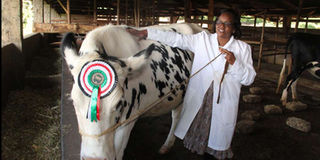The cow that won me a top award

Becky Njoki tends to her Freshian breed cow at her farm in Kingâongâo, Nyeri County on September 20, 2017. The cow was voted Junior Dairy Champion during this year's central region agricultural show. PHOTO | NICHOLAS KOMU|NATION MEDIA GROUP
What you need to know:
- Cleanliness and good hygiene are also important for the animals, with the farmer spraying her cattle to kill pests once a week.
- To make the yoghurt on the farm, she pasteurises the milk by boiling up to 93 degrees and allows it to cool up to about 83 degrees before adding sugar
Becky Njoki left her home on September 14 for the Nyeri agricultural show an optimistic farmer as she had entered her cow into a competition.
However, being a small farmer and a first-time exhibitor, she did not expect much as her animal was facing stiff competition from others that came from well-established farms.
Besides the heifer, Becky had also enlisted her goats into various categories of the competition.
Angel, her two-and-half-year-old heifer weighing 550kg did Becky proud and so were the goats.
Junior Dairy Champion
The Friesian heifer scooped the top award in the Junior Dairy Champion category for small-scale farmers.
The animal’s massive body, its well-shaped udder, among other physical attributes made it win, according to Becky.
Similarly, her German alpine goats won in various categories. Two won the top prize in the best buck and best does categories. Two others were named best dairy goats.
So what is her secret? Becky attributes the win of her heifer to good feeding.
“When my calves are delivered, I bottle feed them with milk from their mothers for five months. Each takes six litres daily, three litres in the morning and the rest in the evening,” she offers, noting
colostrum is important in the development of the immunity of a cow.
After the five months, she cuts milk intake to five litres as she readies to wean the calf.
“I normally introduce hay to the calf to ensure its rumen develops well so that I can start feeding the animal other feeds like silage,” she says.
Once weaning starts, she offers the animals feeds made from maize germ, wheat pollard for energy and soya and cotton seed cake for proteins thrice a day.
Good hygiene
Cleanliness and good hygiene are also important for the animals, with the farmer spraying her cattle to kill pests once a week.
She has 17 animals in total. Five are lactating and five are in-calf. The others are calves of between three to eight months old.
Her five cows produce an average of 35 litres of milk each per day and 40 litres at the peak. She feeds the milk to the calves and uses the surplus to make yoghurt.
For livestock production, the animals occupy five acres of her land which include space used to grow fodder maize for the animals.
To make the yoghurt on the farm, she pasteurises the milk by boiling up to 93 degrees and allows it to cool up to about 83 degrees before adding sugar.
She then cools further up to 43 degrees and adds culture and lets it to cool.
“After six hours, I add various flavours that include vanilla, strawberry and chocolate,” says Becky, 56, who sells a 500ml bottle of yoghurt at Sh60 while a litre goes for Sh120.
Selling to processors
The farmer says she stopped selling milk to processors because of poor payment. The processors are currently buying a litre at between Sh30 and Sh35.
“I chose this path to prove to farmers that they do not need to rely on processors. Anyone can do value addition at the farm level. It is practical for small-scale farmer too,” says Becky, who uses an aluminium sufuria, a jiko or a fire wood to make the yoghurt.
She plans to increase her herd to 20 animals and enhance her value addition. Her dream is to become a top breeder in Mt Kenya region.
Her biggest challenge is finding quality commercial feeds for her animals, noting counterfeiters have invaded the market. She prefers to make her own feeds.
Robert Thuo, a livestock production officer in Nyeri, says awards boost morale of farmers and this the agribusiness.
“Winning at the ASK show exposes one to other farmers and enhances learning. It also gives the farmer a chance to promote their animals to potential customers for breeding and value addition.”





